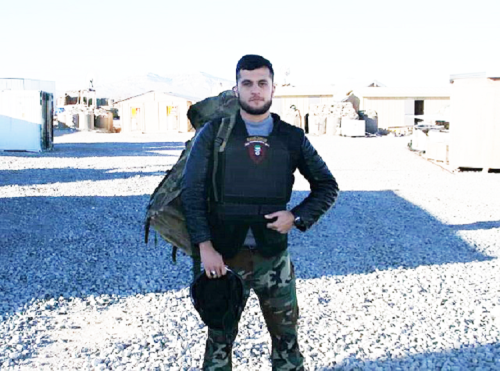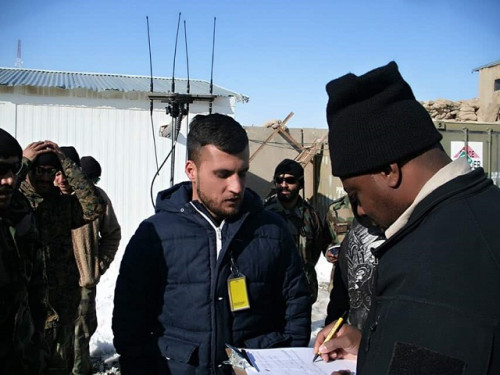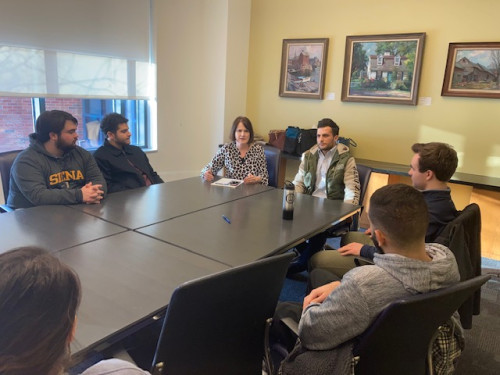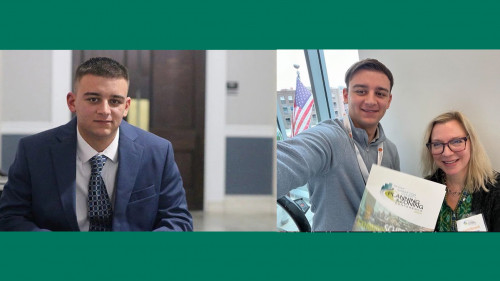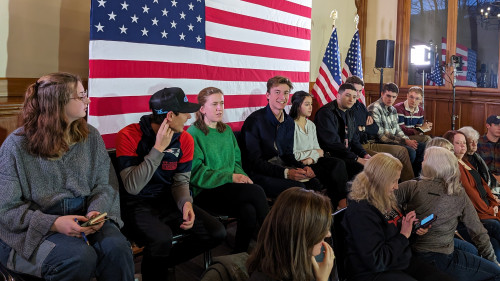
As the U.S. Armed Forces neared the end of troop withdrawal from Afghanistan last August, Hameed Danesh pleaded with the Marines to provide safe passage out of his embattled country for himself and his family.
Danesh was a marked man. He had loyally served the U.S. military for several years as an interpreter, and as the last troops prepared to leave the country and the Taliban geared up to take over the government, anyone who had worked with the Americans was considered an infidel. The Taliban beheads infidels.
A harrowing escape that began on the blazing tarmac at Kabul International Airport ended in safety on the Siena campus the evening of the February 3 ice storm. Danesh, his wife Masouda, and their 18-month-old son Abubaker (“Abu”) are now getting settled in on campus as the first guests of the Every Campus a Refuge (ECAR) program.
Vera Eccarius-Kelly, Ph.D., professor of comparative politics, was instrumental in getting Siena signed on with ECAR and bringing the Danesh family to campus. ECAR was developed by Guilford College in North Carolina, and is based on Pope Francis’ call to welcome and host refugee families. Siena is the first college in the Capital Region to implement that call.
Eccarius-Kelly said the goal of the program is to safely welcome refugee families and provide them with the necessary support to begin an independent life in the United States as soon as they are able. The Daneshes will be living in a free-standing apartment on campus for the next few months.
“Our mission as a Franciscan college is to stand side by side with those in need of support and solidarity,” said Eccarius-Kelly. “This is how we do it. This is how to be a Saint.”
She was assisted by Kiley Lenahan ’23, who worked with her independently last fall to assess the feasibility of hosting a refugee family on campus. This semester, students in Eccarius-Kelly’s Refugee and Migration Studies class are also aiding the family in their transition process by finding them work, offering help on resume writing and job interviewing, delivering halal food and introducing them to life in upstate New York.
The logistics to get the Daneshes here were tremendous, and involved months of work securing the necessary visas, transportation, health care, housing and personal items. Eccarius-Kelly has a great deal of experience assisting refugees in the Capital Region; she has been active with the Refugee Welcome Center in Albany for years.
Hameed, 29, has a bachelor’s degree in business administration and a work permit for the U.S. He speaks fluent English and Pashto in addition to his native Dari, as well as some Arabic and Urdu. His wife, 24, (they married in 2019) was formerly a teacher, and will soon start English lessons. Their little son is on medication for ear infections, a condition that was unable to be treated properly during the family’s exodus over the past five months. His parents hope to find a local play group for him.
The family is technically on “humanitarian parole,” and is applying for special immigrant visa status, and eventually hope to receive their green cards.
Danesh will be able to give back to the Siena community during his residency on campus. He plans to speak to various classes about his family’s experience and his work with the U.S. military.
When the U.S. announced that it would be withdrawing troops from Afghanistan, Danesh knew that he and his family would need to escape quickly. A former school principal with a preternatural gift for languages, he served as an interpreter for American military personnel and contractors, and as a liaison between the U.S. and Afghan special forces. He explained that the Taliban saw that as akin to being “with the devil.”
Thousands of other desperate Afghanis, also fearing life under the Taliban, hoped to leave the country as well. The language skills that served Danesh and his American contacts in provinces throughout Afghanistan were his family’s ticket out of the country.
In August the Taliban were going door to door in Kabul rounding up those they believed were infidels. Danesh said he and his family “hardly slept for 10 days” fearing that fateful pounding on their own door. They eventually headed for the airport; Danesh deposited his wife and son near a tree and told them to wait while he tried to arrange passage out.
A moat filled with fetid sewage water surrounded Abbey Gate the airport, and thousands of Afghanis hoping to escape crowded into it, pushing and shoving, trying to gain the attention of U.S. Marines who were guarding the lone evacuation point.
Danesh caught the attention of one Marine by waving his active official interpreter’s badge; he was plucked from the throng on the condition that he interpret instructions for the military to those trying to flee the country.
For hours in the oppressive heat, with the U.S. Marines at his back and sides and his despairing countrymen in front of him, he issued instructions and hope to people trying to make it out. As darkness fell, Danesh was able to collect his frightened family and get on a military transport plane.
“I’m alive. My family is alive,” he said. “I’m thankful to the Marines who did this for me. They saved my life.”
He noted that the Marines were exceptionally polite throughout the ordeal at the airport, even carrying his family’s backpacks as they escorted them to the plane.
Danesh’s parents and siblings were also fortunate enough to make it out of Afghanistan, and are currently residing in Germany. Masouda’s family remains behind in their native country but they are safe for now.
After a pitstop in Qatar, the family went on to Ramstein Air Base in Germany for two months, where Danesh talked with General Mark Milley, chairman of the Joint Chiefs of Staff. The family was then airlifted to Fort Pickett in Virginia for another two months, then finally arrived in Albany in January. They were selected for the ECAR program because of Danesh’s outstanding military service and excellent educational background, said Eccarius-Kelly.
Lenahan, who spent the fall semester working with Eccarius-Kelly to have the ECAR program approved, helped organize the wrap-around services the family would need. The plan to host a refugee family was enthusiastically approved by President Chris Gibson.
“It has been really rewarding to see all of my efforts come to fruition and to meet such brave and kind people,” said Lenahan. “Hameed, Masouda, and little Abu have been so gracious, and I am excited for us to learn from each other over the course of their time here.”
Hussein Fayad ’24 is assisting with the program this semester.
“I commend Siena for joining ECAR. Recognizing the tremendous suffering and loss that Afghanistan has endured and actively committing to making a difference in people's lives is a formidable yet vital step in forming a mindful community,” he said. “Hameed and his family have shown exceptional strength to face the future confidently, and we look forward to sharing that experience with them.”
Danesh said he and his wife and son are looking forward to getting settled in America.
“I am looking forward to living a long life in this peaceful country,” he said. “I’m grateful for the opportunity to be here at Siena and for everyone’s support.”
